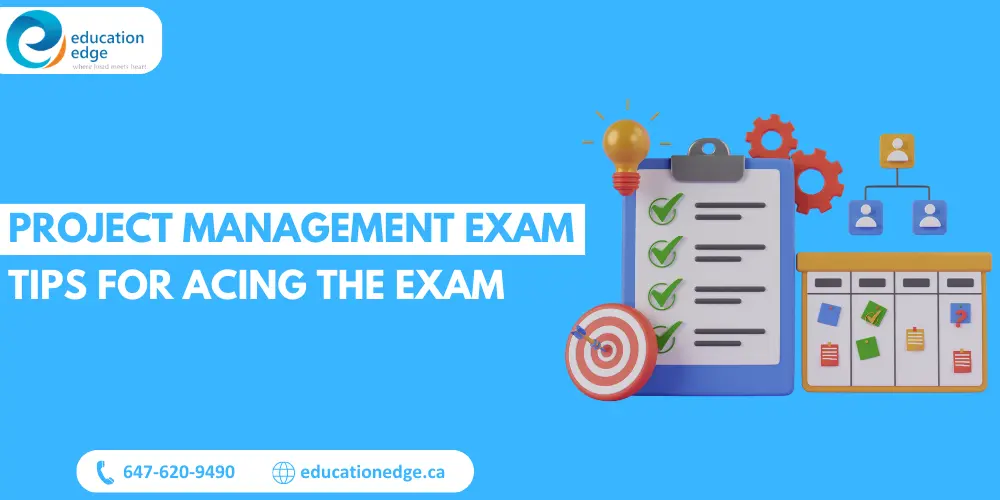
Are you preparing to take your Project Management Exam? To pass the Project Management Exam, effective strategies are required. Hence, it is more than just a memorization test. It is a journey that requires the practical application of concepts and tactics.
Project management is now essential in all businesses, focusing on the need for skilled people. Hence, it is essential to show project management skills through a Project Management Exam.
What is Project Management Exam?
A Project Management Exam is an organized exam, which measures a person’s knowledge and skills in project management principles and practices.
It often covers fundamental concepts such as project initiation, scope management, time and cost management, risk evaluation, and stakeholder communication.
Passing the exam leads to project management certification, which shows your skills in project management principles and practices.
Types of Project Management Exam
Here are the top 5 types of project management exams.
1. Project Management Professional (PMP)
2. Certified Associate in Project Management (CAPM)
3. Program Management Professional (PgMP)
4. Portfolio Management Professional (PfMP)
5. Agile Certified Pactitioner (ACP)
PMP:
The PMP certification is one of the best project management course and most well recognized certificates for project managers in the world. It covers a wide range of issues, such as project planning, execution, monitoring, and closing.
PMP Exam Pattern
The PMP certification exam contains 200 multiple-choice questions, 175 of which count toward the final score. Complete all questions within the 4 hour; no negative marking for incorrect answers.
Eligibility for PMP Exam
Option 1:
- Bachelor’s degree or equivalent
- At least 36 months of professional project management experience
- 35 contact hours or PDUs in project management education, or CAPM certification
Option 2:
- High school diploma, associate’s degree, or equivalent
- Minimum of 60 months of professional project management experience
- 35 contact hours or PDUs in project management education, or CAPM certification
PMP Exam Fee
| PMP Exam | PMI Member | Non-PMI Member |
| PMP Exam: First Time | $405 | $555 |
| PMP Retake Exam | $275 | $375 |
CAPM:
The CAPM certification verifies core knowledge in project management and is ideal for entry-level professionals. It serves as an entry point for people seeking the PMP certification.
CAPM Exam Pattern
The CAPM exam comprises 150 questions, to be completed within 4 hours, assessing project management fundamentals. The following languages are available for the CAPM certification exam:
- English
- Spanish
- Arabic
- Italian
- French
- Portuguese (Brazilian)
- German
- Japanese
Eligibility of CAPM Exam
To take the CAPM exam, you need to:
- Possess a secondary degree (e.g., high school diploma, GED, or equivalent).
- Complete at least 23 hours of project management education, which can be fulfilled with PMI’s online Project Management Basics course before the exam.
CAPM Exam Fee
| CAPM Exam | PMI Member | Non-PMI Member |
| PMP Exam: First Time | $225 | $300 |
Candidates can attempt the CAPM exam three times annually, requiring deposits of $150 and $200.
PgMP:
The Project Management Institute’s Program Management Professional (PgMP) certification is worldwide recognized. It relates to the success of experienced program managers in directing interconnected initiatives toward strategic business objectives.
PgMP Exam Pattern
The CAPM exam comprises 170 questions, to be completed within 4 hours, assessing project management fundamentals.
Eligibility of PgMP Exam
To be eligible for the PgMP exam, you need to:
Option 1:
- Four-year College/University Degree
- 48 months of project management or PMP
- 48 months of program management in the last 15 years
Option 2:
- High school diploma or Associate’s Degree
- 48 months of project management or PMP
- 84 months of program management in the last 15 years
Cost of PgMP Exam
PgMP Exam | PMI Member | Non-PMI Member |
| $800 | $1,000 |
PMI-ACP:
The PMI-ACP is a globally acknowledged Agile Certified Practitioner (ACP) certification. It consists of various agile principles, tools, and methodologies like Kanban, Scrum, Lean, and more allowing agile practitioners to apply versatile skills across projects.
PMI-ACP Exam Pattern
The PMI-ACP exam comprises 120 multiple-choice questions, to be completed within 3 hours. Twenty out of 120 multiple-choice questions are unmarked pore-test questions.
Eligibility of PMI-ACP Exam
To be eligible for PMI-ACP exam, you need to:
- Secondary degree required
- 21 contact hours of agile practice training
- 12 months of general project experience in the last 5 years (PMP/PgMP optional)
- 8 months’ experience with agile projects in the past 3 years
PMI-ACP Exam Fee
PMI-ACP Exam | PMI Member | Non-PMI Member |
| CBT: $435 PBT: $385 | CBT: $495 PBT: $445 |
Benefits of Taking Project Management Exam
The following are the benefits of taking a project management exam.
- Improved career prospects and opportunities
- Enhanced project planning and execution skills
- Globally recognized certification credential
- Increased earning potential and salaries
- Networking opportunities within the industry
- Better understanding of risk management
- Efficient resource allocation and utilization
- Show commitment to professional development.
- Access to diverse project management methodologies
- Ability to lead and motivate teams
Tips to Acing the Project Management Exam
Here are the tips that will help you to ace the project management exam.
1. Understand the PMBOK Guide:
The Project Management Body of Knowledge (PMBOK) Guide is a key resource. Ensure a solid understanding of its concepts, processes, and terminology.
2. Make a Study Plan:
Organize your study materials into smaller parts. Assign dedicated time for each topic. Regularly review and adjust your plan for accuracy.
3. Use Multiple Resources:
Utilize textbooks, online courses, practice exams, and other study materials.
Seek different perspectives to enhance your understanding of various concepts.
4. Practice with Sample Questions:
Familiarize yourself with the format and style of exam questions. Practice solving sample questions to improve your time management and critical thinking skills.
5. Join Study Groups:
Engage with peers or online study groups to discuss concepts and share insights. Therefore, teaching others can solidify your understanding of the material.
6. Stay Updated with Changes:
Be aware of any updates or changes in project management methodologies. Ensure your study material is aligned with the latest standards.
7. Create Exam Conditions:
Take practice exams under timed conditions to simulate the real exam environment. This helps in building stamina and managing time effectively during the actual exam.
8. Review Mistakes:
Analyze your mistakes in practice exams to understand the underlying concepts, and concentrate on strengthening your weak points.
Frequently Asked Questions
1. Are online courses a good way to study for exams?
ANS: Yes, several online courses with interactive information and practice exams offer efficient exam preparation.
2. How can I efficiently manage my time throughout the exam?
ANS: Prioritize questions, schedule time per section, and practice time management strategies regularly.
3. Is it useful to network with exam-passing professionals?
ANS: Absolutely, getting insights from successful experts provides helpful ideas and improves your exam preparation.







